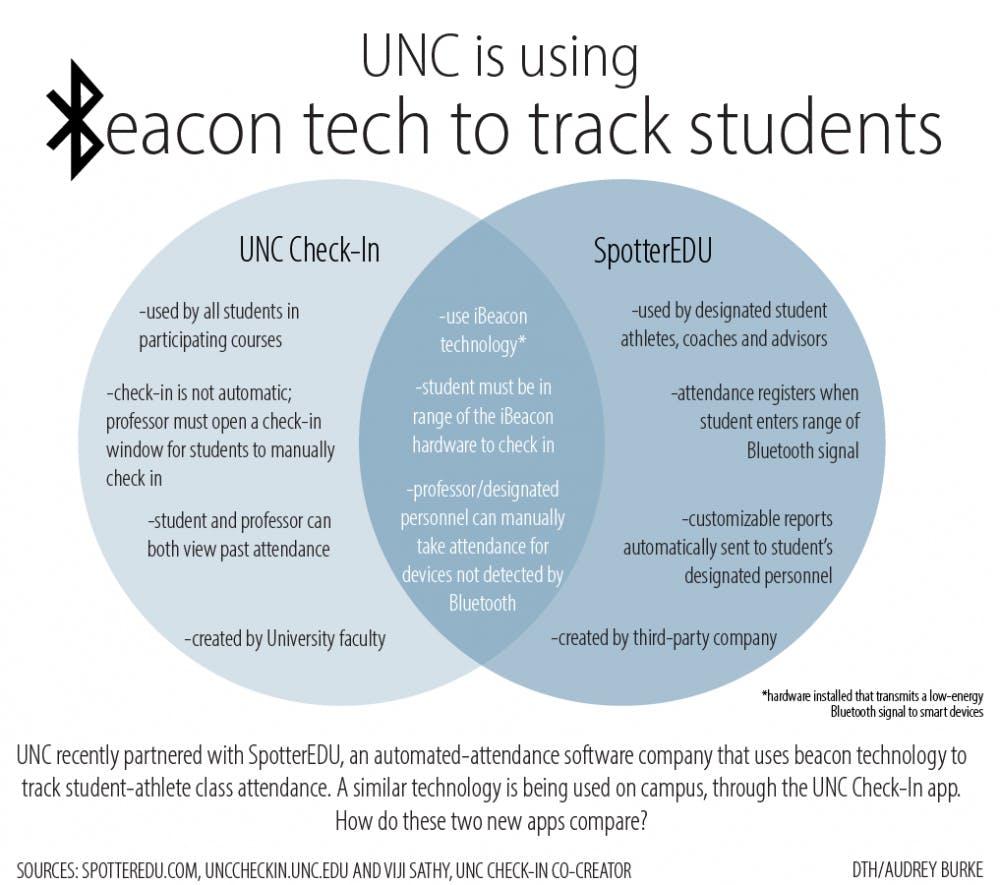SpotterEDU works with many other universities, including North Carolina State University, Duke University, Syracuse University and Columbia University.
The software offers support specifically tailored to student-athletes, the student body and for various events, but is currently being used only by student-athletes at UNC, Director of Media Relations Joanne Peters Denny said in an email to The Daily Tar Heel.
The app doesn’t use GPS tracking, which, according to the company’s website, means it doesn’t locate anyone anywhere other than their designated classroom. Spotter automates all attendance recording, sending real-time alerts to either professors or coaches, which pinpoint students within a classroom until they leave.
Not all UNC faculty are embracing the new technology.
“That’s part of the story of American universities today," said Susan King, dean of the School of Media and Journalism. "I think we really need to be engaged so people aren’t wondering if they’re being surveilled. I think our faculty need to be informed about any changes that happen with our athletic policies — it would just make people either agree, or disagree, and (they) could discuss it. But if they don’t know, they’re left with worry — or worse, conspiratorial feelings."
King removed a Bluetooth device in Carroll Hall after being contacted by a concerned faculty member. While she understands the need for a more efficient attendance process, King said she believes the University should be in communication with faculty and administrators about any new processes.
"My sense is that the communication has just not been good enough," King said. "Because there was no communication."
The Bluetooth device King had removed was installed while journalism professor Barbara Friedman was teaching on the first day of classes. An individual entered Friedman's class and requested to install a device on the wall. When she asked him what kind of device he was installing, the man said it was a tracking device that worked with an app to make sure athletes are in their classes.
Soon after witnessing this, Friedman posted about the event on Facebook. King had the device removed the next morning.
To get the day's news and headlines in your inbox each morning, sign up for our email newsletters.
Friedman said faculty don't need help taking attendance, and that many of them provide student-athlete progress reports to the University as requested.
“There is a natural consequence to skipping classes -- the student’s grade declines,” Friedman said. “Tracking student-athletes’ whereabouts with an app infantilizes them, and I can’t imagine it helps to discover and address the conditions that lead to them to miss class in the first place.”
In an email to The Daily Tar Heel, Peters Denny said the provost’s office is heading the program in cooperation with UNC Athletics.
“The University has long had an attendance policy for student-athletes, which can include class checking. This new pilot is simply an effort to make the program more efficient through using new technology,” Peters Denny said.
A similar technology is being used on campus for the student body through an app called UNC Check-In. Created by UNC professor Viji Sathy and ITS Teaching & Learning, the app was created to help taking and keeping track of attendance in large lecture classes more feasible. Sathy said she has received positive feedback from both faculty and students since its launch in spring 2018, with no complaints of invasiveness.
Both UNC Check-In and SpotterEDU use beacon technology to record attendance. Whereas SpotterEDU has an automated check-in and is currently geared only to student-athletes, UNC Check-In requires students to manually check in once they are in range of the Bluetooth device in their classroom.
UNC media law professor Tori Ekstrand, faculty co-director of the UNC Center for Media Law and Policy, contacted King after learning of the devices on social media. Even though she said she is horrified by this technology, she said she is not surprised, given the scrutiny the athletics department is under.
Ekstrand said she was shocked faculty had not been notified about this change and believes this raises questions surrounding the legality of surveillance without notice. Still, the lack of communication reflects a larger lack of discussion about increasing surveillance — there is currently not an effective set of state or federal law to address this, Ekstrand said.
“It’s not that surveillance and feedback isn’t important – it is and this had been going on between instructors and the athletic department for years,” she said. “What happened last week is emblematic of what’s happening in a lot of places, on a daily basis in a lot of different parts of our lives, and it is just happening without us having, really, good conversations about this.”
special.projects@dailytarheel.com




